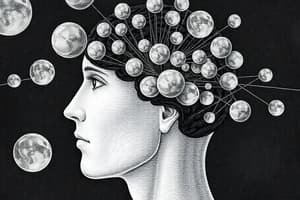Podcast
Questions and Answers
What is the main focus of self-esteem in personal development?
What is the main focus of self-esteem in personal development?
- How you are perceived by your peers
- How much you value others
- How much you value yourself (correct)
- How you wish to be perceived
During which cognitive development stage do children begin to understand the concept of conservation?
During which cognitive development stage do children begin to understand the concept of conservation?
- Preoperational Stage
- Concrete Operational Stage (correct)
- Formal Operational Stage
- Sensori Motor Stage
Which of the following stages of Erikson's psychosocial development addresses the challenge of forming intimate relationships?
Which of the following stages of Erikson's psychosocial development addresses the challenge of forming intimate relationships?
- Identity vs. Confusion
- Intimacy vs. Isolation (correct)
- Autonomy vs. Shame
- Integrity vs. Despair
What is considered a hallmark of the 'Id' component of personality according to Freud?
What is considered a hallmark of the 'Id' component of personality according to Freud?
In Erikson's stages, which conflict occurs during the age range of approximately 10-19 years?
In Erikson's stages, which conflict occurs during the age range of approximately 10-19 years?
What cognitive ability is primarily developed during the Formal Operational Stage?
What cognitive ability is primarily developed during the Formal Operational Stage?
How does Erikson describe the result of successfully overcoming the 'Initiative vs. Guilt' stage?
How does Erikson describe the result of successfully overcoming the 'Initiative vs. Guilt' stage?
What characterizes the Preoperational Stage of cognitive development?
What characterizes the Preoperational Stage of cognitive development?
Which component of personality is responsible for moral judgments?
Which component of personality is responsible for moral judgments?
Adolescence is defined as the period of life from ages 13 to 20.
Adolescence is defined as the period of life from ages 13 to 20.
What is the term for a child's ability to understand that objects continue to exist even when they cannot be seen?
What is the term for a child's ability to understand that objects continue to exist even when they cannot be seen?
The stage of psychosocial development where infants learn to trust caregivers is known as _____ vs. Mistrust.
The stage of psychosocial development where infants learn to trust caregivers is known as _____ vs. Mistrust.
Match the stages of Erikson's psychosocial development to their associated conflicts:
Match the stages of Erikson's psychosocial development to their associated conflicts:
During which stage do children begin to take the lead in activities and make choices?
During which stage do children begin to take the lead in activities and make choices?
The Concrete Operational Stage is characterized by egocentric thinking.
The Concrete Operational Stage is characterized by egocentric thinking.
The _____ stage of cognitive development is where children learn to think logically about concrete events.
The _____ stage of cognitive development is where children learn to think logically about concrete events.
Who is known as the father of psychoanalysis?
Who is known as the father of psychoanalysis?
The ability to think abstractly and logically develops during which of Piaget's stages?
The ability to think abstractly and logically develops during which of Piaget's stages?
Flashcards are hidden until you start studying
Study Notes
Self-Concept
- A person's abstract and general idea about themselves.
- Self-Image: How a person sees themselves.
- Self-Esteem: How much a person values themselves.
- Ideal-Self: How a person wishes they could be
Sigmund Freud
- A well-known psychologist and neurologist.
- Creator of psychoanalysis theory.
- Considered the father of psychoanalysis.
- Proposed the three components of personality:
- Id: Driven by instinctual needs and desires.
- Ego: Provides guidelines for behavior while fulfilling pleasure.
- Super Ego: Holds moral judgments about what is right and wrong, guiding people to avoid hurting others.
Adolescence
- Period of psychological and social development and changes, generally occurring between the ages of 10-19 years.
- Menarche: The first menstruation of a woman.
Stages of Development/Challenges
Psychosocial Development Theory (Erik Erikson)
- Trust vs. Mistrust: Infants learn to trust caregivers based on the consistency of their needs being met.
- Autonomy vs. Shame: Children foster their independence by trying out new skills, but they might feel doubt and embarrassment when encountering difficulties.
- Initiative vs. Guilt: Children take the lead in activities and make choices, but feelings of guilt may emerge if they receive excessive criticism.
- Industry vs. Inferiority: A sense of competence from accomplishing tasks is developed.
- Identity vs. Confusion: Teens work to discover their identity and understand themselves; difficulty in this process can result in uncertainty.
- Intimacy vs. Isolation: Adults form close and intimate relationships.
- Generativity vs. Stagnation: Adults contribute to society through work and family.
- Integrity vs. Despair: Reflecting on life with a sense of fulfillment or regret.
Cognitive Development Theory (Jean Piaget)
- Sensori Motor Stage: The development of object permanence - the understanding that objects continue to exist even when out of sight.
- Preoperational Stage: Children begin to use language and think symbolically, but their thinking is egocentric and intuitive rather than logical.
- Concrete Operational Stage: Children understand the concept of conservation (quantity remains the same regardless of shape) and can classify objects.
- Formal Operational Stage: Adolescents develop the ability to think abstractly and logically.
Self-Concept
- Refers to an individual's abstract and general idea of themselves.
- Includes self-image, self-esteem, and ideal-self.
- Self-image: How a person sees themselves.
- Self-esteem: How much a person values themselves.
- ** Ideal-self:** How a person wishes they could be.
Sigmund Freud
- Well-known psychologist and neurologist.
- Creator of psychoanalysis theory, also dubbed the "father of psychoanalysis."
- Proposed the three components of personality:
- Id: Represents instinctual needs and desires.
- Ego: Provides guidelines for behavior while fulfilling the id's pleasure.
- Superego: Holds moral judgments about right and wrong, guiding life towards avoiding harm to others.
Adolescence
- Period of psychological and social development and changes.
- Typically spans from 10 to 19 years of age.
- Marked by menarche for females, which represents their first menstruation.
Stages of Development/Challenges
- Focus on psychological and social changes during life.
Psychosocial Development Theory (Erik Erikson)
- Outlines stages of psychosocial development with specific challenges to overcome.
- Trust vs. Mistrust (Infancy): Infants learn to trust caregivers based on whether their needs are consistently met.
- Autonomy vs. Shame and Doubt (Early Childhood): Children explore independence; difficulties lead to feelings of shame and doubt.
- Initiative vs. Guilt (Preschool): Children become more proactive in activities and choices; excessive criticism leads to guilt.
- Industry vs. Inferiority (School Age): Children develop competence through successful task completion.
- Identity vs. Role Confusion (Adolescence): Teens navigate self-discovery; difficulty in this process results in uncertainty.
- Intimacy vs. Isolation (Young Adulthood): Adults form close relationships and find love.
- Generativity vs. Stagnation (Middle Adulthood): Adults contribute to society through work and family.
- Ego Integrity vs. Despair (Late Adulthood): Older adults reflect on their life with a sense of fulfillment or regret.
Cognitive Development Theory (Jean Piaget)
- Describes stages of cognitive development with focus on how thinking progresses.
- Sensorimotor Stage (Infancy): Infants learn through senses and motor skills, developing object permanence.
- Preoperational Stage (Early Childhood): Children start using language and symbolic thinking, but thinking remains intuitive and egocentric.
- Concrete Operational Stage (Middle Childhood): Children develop logical thinking and grasp conservation.
- Formal Operational Stage (Adolescence): Adolescents develop abstract and logical thinking abilities.
Studying That Suits You
Use AI to generate personalized quizzes and flashcards to suit your learning preferences.




